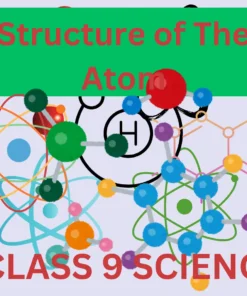Natural Resources CLASS 9 SCIENCE
$40.00 Original price was: $40.00.$25.00Current price is: $25.00.
Introduction to Natural Resources
Natural resources are the raw materials that the Earth provides, which are essential for the survival and development of living organisms, including humans. These resources can be broadly classified into two categories: renewable and non-renewable resources. Renewable resources are those that can replenish themselves over time, such as sunlight, wind, and water. In contrast, non-renewable resources, like fossil fuels and minerals, exist in finite amounts and cannot be replaced once they are depleted.
Introduction to Natural Resources
Natural resources are the raw materials that the Earth provides, which are essential for the survival and development of living organisms, including humans. These resources can be broadly classified into two categories: renewable and non-renewable resources. Renewable resources are those that can replenish themselves over time, such as sunlight, wind, and water. In contrast, non-renewable resources, like fossil fuels and minerals, exist in finite amounts and cannot be replaced once they are depleted.
The importance of natural resources cannot be overstated, as they form the backbone of human existence and societal progress. Water is crucial for life, supporting various ecosystems and human agriculture. Air, an essential natural resource, is vital for respiration in all aerobic organisms. Soil plays a fundamental role in food production, supporting crops and livestock, while forests are key for biodiversity and carbon absorption, contributing to environmental stability.
Additionally, minerals, extracted for various uses such as construction and manufacturing, significantly impact technological advancements and economic growth. Countries rich in natural resources often experience economic prosperity, as these materials can be traded or utilized for domestic development. However, the exploitation of these resources must be balanced with conservation efforts to ensure sustainability for future generations. Awareness and education about how to manage and utilize natural resources effectively is critical, especially for students studying science in Class 9.
The interdependence between natural resources and society is clear: as resources are harnessed, they foster economic growth and improve the quality of life, illustrating the need to understand and protect these valuable assets. In conclusion, a comprehensive understanding of natural resources is essential for responsible stewardship and sustainable development.
Sustainable Management of Natural Resources
The sustainable management of natural resources is crucial for ensuring their availability for future generations. This approach emphasizes the necessity of conserving these resources while meeting current needs. As natural resources such as water, forests, and minerals are finite, the balance between consumption and preservation must be maintained. Sustainable practices are imperative not only for environmental protection but also for the well-being of society as a whole.
One of the key strategies for sustainable resource management is recycling. By reprocessing materials, we can significantly reduce the demand for raw resources, which in turn minimizes environmental degradation. For instance, recycling paper helps to conserve trees, while recycling plastics reduces the need for petroleum extraction. In addition to recycling, implementing conservation practices, such as using water-efficient appliances and reducing energy consumption, can lead to substantial benefits. Conservation directly influences the quality and availability of natural resources, fostering a healthier ecosystem.
Modern technology plays a pivotal role in enhancing the efficiency of resource management. Innovations in renewable energy, such as solar and wind power, reduce reliance on fossil fuels, mitigating the adverse effects of climate change and pollution. Furthermore, advancements in agricultural technology facilitate more sustainable farming practices, leading to better land management and soil health. By integrating technology in resource management, society can create sustainable systems that not only support current populations but also protect the environment.
It is important to acknowledge that human activities have a profound impact on natural resources. Deforestation, overfishing, and pollution threaten the sustainability of ecosystems. Therefore, policies promoting sustainability—such as reforestation efforts and the development of renewable energy sources—are essential in mitigating these effects. The collective responsibility lies with individuals, communities, and governments to adopt sustainable practices that will safeguard natural resources for future generations.
Be the first to review “Natural Resources CLASS 9 SCIENCE” Cancel reply
Related products
CLASS 9
CLASS 9
CLASS 9
Uncategorized











Reviews
There are no reviews yet.